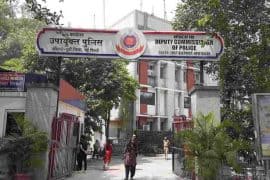From small-business owners to regular students and teachers, the diverse Delhi diaspora is split on opinions related to the G20 ‘Lockdown’.
While newspaper, TV, and social media headlines have branded the G20 Summit in Delhi a “huge success” for India and the Modi government, the story of Delhi says quite the contrary. With universities, offices, and other institutions shut down for a 5-day period while we were solving problems at the global level within the sanctum of ‘Bharat Mandapam’, the city of Delhi had come to a standstill, claiming several victims of this global show of power.
The University of Delhi was shut down for a period of five days, from October 6th to October 10th, 2023, on the occasion of the G20 summit. In conversation with several students regarding this frequent shutting down of the university on several occasions, an ‘apolitical diaspora’ of students reacted with, “We were more than happy to get such a long weekend.” However, another section of students also say that these continuous holidays ‘hamper their academic schedules’ considering the already shortened semesters—thanks to the newly introduced Four-Year-Undergraduate Program (FYUP)—due to which both teachers and students struggle to catch up with the course syllabus later.
In conversation with an assistant professor from the University of Delhi, quite a different perspective can be gauged.
India taking over the G20 Presidency is a matter of pride for every Indian. Closure of educational institutions in the capital for the preparation of G20 Summit may have caused a little inconvenience to some but it was a great opportunity for India as it was attended by world leaders. In such a situation, teachers usually give students assignments, readings or activities that can be done during the break and then plan catch up/review sessions. Teachers always put in that extra effort to work towards the welfare of the students’ community.
Contrary to this, another assistant professor claims the following,
The dispersal of classes a few days before the actual event (G20 Summit) was wholly unnecessary. The lockdown in general felt excessive, we’ve held such events before, and telling citizens not to step out was very inconvenient. The blocking of roads for instance caused unnecessary stress. DU is anyway suffering because of NEP, in terms of truncated syllabi and less number of lectures, and on top of that such unscheduled holidays make a mockery of education.
A simple stroll through Purani Dilli during the G20 weekend brought us into contact with several daily-wage workers like rickshaw-pullers who mentioned,
The road blocking has caused us to take longer routes that take much more time than usual. In order to get to Nizamuddin from Chandni Chowk, one has to make a detour through Mandi House which can take nearly an hour. Because of the lockdown, customers are few and we compensate by charging extra for the longer route from the handful of customers.
While green curtains and G20 banners veiled the tragic truth of the Delhi diaspora, stray dogs, local shops, and even sex workers were ‘hidden from sight’. On this note, a DU student residing near Vasant Vihar claimed that,
I’ve noticed several sex workers near Munirka who usually do their business under the Munirka flyover. However, 2-3 days before G20, ITBP soldiers were seen clearing the area who hauled all the 10-12 sex-workers into their jeeps and they were never seen since then.
A sanitation worker and caretaker at one of the reputed student PGs, Stanza Living, had the following to share,
The army stationed at every corner of the road put too many restrictions for me to reach my workplace. They would ask me, “Kaha jaa rahe ho? ID dikhao” (Where are you going? Show me your ID) at every 10-minute interval. Mai kya inke liye kaam na karke ghar pe baithi rahu? (Should I stop working for their sake and rather sit at home?)
While heartbreaking videos regarding stray dogs being violently dragged to unknown hiding places have made the rounds on the internet, the irony lies in the fact that such a large-scale global event aimed at solving global issues was conducted while millions were suffering at home. Local shops being covered with G20 banners caused a drop in the incomes of those business owners, while several daily-wage workers suffered economically too, thanks to the lockdown.
With massive investments of nearly 4000 crores being made towards the G20 for ‘Delhi Beautification’ and the ‘Bharat’ renaming rumours doing the rounds, which could cost an additional 14,000 crores, the scary question then arises: how long will this government turn a blind eye to the sufferers at home? How many more victims will this ‘unchecked’ power claim before the actual ‘achche-din’? What does the G20 bring in return for all these ‘hidden’ victims? Will it all be worth it after all?
Read Also: The Green Curtains of G20: Solution to All of Bharat’s Woes
Featured Image Credits: Down To Earth





Comments are closed.